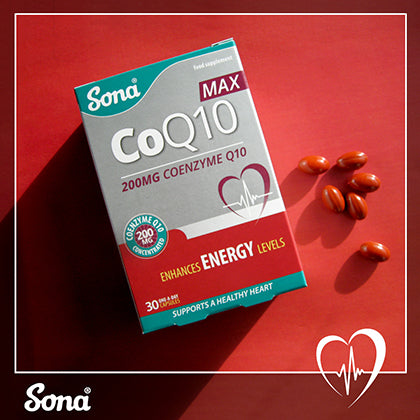
Coenzyme Q10, or CoQ10 is a nutrient essential for many processes in our bodies. It occurs naturally in our body but declines as we age. However, other factors such as medication, genetic disorders and other diseases can increase the rate in which our production of CoQ10 declines, which can have detrimental effects on our heart health.
Food which naturally contain CoQ10 include:
- Soybeans
- Nuts and seeds such as sesame seeds, pistachios, and peanuts
- Oily fish such as salmon
- Eggs
- Wholegrains
- Organ meat such as liver, kidney, and heart
However, there is not enough CoQ10 in these foods to actively increase our levels of CoQ10 in our bodies.
Since CoQ10 is vital for most of our cellular processes, its main function is to help cell metabolism and to act as an antioxidant, protecting against cell damage. As a result, CoQ10 can help in many other avenues of our health, particularly our heart health.
Heart Health
In Ireland, heart disease is the most common cause of death with over 6,000 people having heart attacks each year. However, there is some good news, which is that up to 80% of these heart attacks are preventable through lifestyle changes
Supplementing with CoQ10 is also linked to improving heart disease outcomes. Research has found that treatment of CoQ10 supplementation over a period of two years can help to improve heart failure symptoms, as well as reducing the risk of death from heart disease.
Another study which included over 600 people found that those who supplemented with CoQ10 were less likely to be hospitalised for heart failure and had less complications than those who did not take the supplement.
Since we cannot get sufficient levels of CoQ10 from food, and our natural levels of CoQ10 decline as we age, it might be important for some people to consider a CoQ10 supplement, particularly those using statins or with congestive heart failure.
Sona CoQ10 MAX provides 200mg of CoQ10 per capsule to help enhance energy levels and support a healthy heart. Each capsule contains a small amount of oil to help aid the absorption of CoQ10.
References
croi.ie
Arenas‐Jal, M., Suñé‐Negre, J.M. and García‐Montoya, E., 2020. Coenzyme Q10 supplementation: Efficacy, safety, and formulation challenges. Comprehensive Reviews in Food Science and Food Safety, 19(2), pp.574-594.
Dludla, P.V., Nyambuya, T.M., Orlando, P., Silvestri, S., Mxinwa, V., Mokgalaboni, K., Nkambule, B.B., Louw, J., Muller, C.J. and Tiano, L., 2020. The impact of coenzyme Q10 on metabolic and cardiovascular disease profiles in diabetic patients: A systematic review and meta‐analysis of randomized controlled trials. Endocrinology, diabetes & metabolism, 3(2), p.e00118.
Goudarzi, S., Memar Montazerin, S., Najafi, H., Shojaei, F. and Chi, G., 2020. Effect of Vitamins and Dietary Supplements on Cardiovascular Health. Critical pathways in cardiology, 19(3), pp.153-159.
Gül, I., Gökbel, H., Belviranli, M., Okudan, N., Büyükbaş, S. and Başarali, K., 2011. Oxidative stress and antioxidant defense in plasma after repeated bouts of supramaximal exercise: the effect of coenzyme Q10. The Journal of sports medicine and physical fitness, 51(2), pp.305-312.
Morisco, C., Trimarco, B. and Condorelli, M., 1993. Effect of coenzyme Q 10 therapy in patients with congestive heart failure: a long-term multicenter randomized study. The clinical investigator, 71(8), pp.S134-S136.
Mortensen, S.A., Rosenfeldt, F., Kumar, A., Dolliner, P., Filipiak, K.J., Pella, D., Alehagen, U., Steurer, G., Littarru, G.P. and Q-SYMBIO study investigators, 2014. The effect of coenzyme Q10 on morbidity and mortality in chronic heart failure: results from Q-SYMBIO: a randomized double-blind trial. JACC: Heart Failure, 2(6), pp.641-649.
Pence, J.C., Martin, K.R. and Bloomer, R.J., 2021. Beyond Nutrition Recommendations: What Healthcare Professionals Should Know about Dietary Supplements to Best Serve Their Patients. Health, 13(4), pp.334-346.
